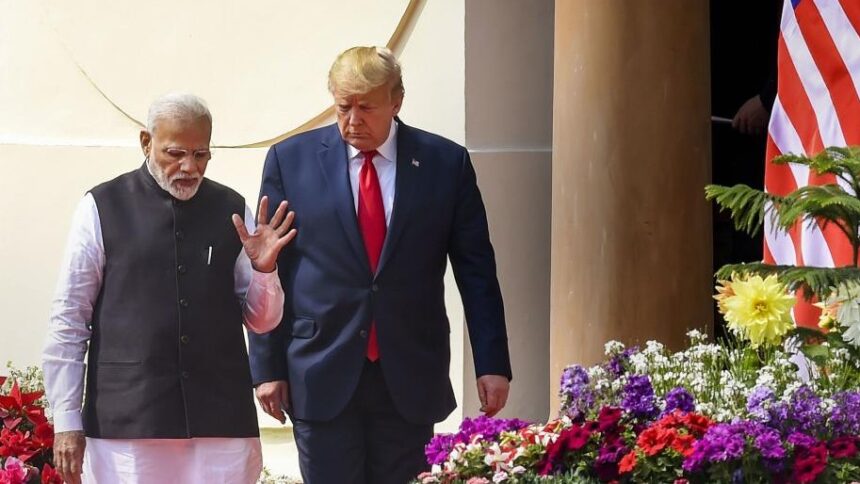NEW DELHI– The United States has imposed a heavy 50% tariff on goods imported from India. President Donald Trump announced this decision in response to India’s ongoing oil trade with Russia, which Washington says helps fund Russia’s war against Ukraine.
The new order, issued on 6 August 2025, increases tariffs from 25% to 50%, adding an extra “penalty” due to India’s Russian oil purchases. Indian officials call these tariffs “unfair, unjustified, and unreasonable,” signalling growing friction between the two governments, once called close allies.
White House Calls Oil Imports a “National Emergency”
In a statement, the White House said President Trump aims to put pressure on countries doing business with Russia, arguing their trade supports Moscow’s military push in Ukraine.
The order, which starts on 27 August 2025, claims, “The Government of India is currently, directly or indirectly, importing oil from the Russian Federation,” and says an extra 25% tariff is required to “protect US interests” because of Russia’s actions in Ukraine.
Officials also mentioned that the announcement followed talks between Trump’s envoy Steve Witkoff and Russian President Vladimir Putin, which had focused on trying to reach a ceasefire in Ukraine.
US officials accuse India of buying large volumes of Russian oil and then exporting refined products abroad, making strong profits and blunting attempts to cut Russia off from global markets.
This attitude marks a shift from the US position after 2022, when American officials privately supported India’s oil imports to keep markets stable as global prices rose due to war.
Why the US Is Targeting India
Trump’s decision appears to stem from both political and trade disputes. In a recent CNBC interview, the president criticized India’s trade policies, calling India “not a good trading partner” and pointing to its oil imports from Russia. He has also voiced concern over India’s barriers to US farm and dairy goods, which have stalled trade talks between the countries.
In 2024, the US trade deficit with India reached $45.8 billion, with imports from India amounting to $87.4 billion. The new tariffs will hit industries like textiles, gemstones, jewellery, and auto parts, all key areas of Indian exports.
Some observers believe the White House hopes to hurt Russia’s economy by squeezing India, though critics doubt this plan’s effectiveness. China, a much larger buyer of Russian oil, and Turkey have not faced similar penalties, raising questions about the fairness of the US approach.
This selective targeting comes as the US itself imported $3.5 billion of goods from Russia in 2024, including uranium and fertilizers.
US Charges India with Funding Russia
According to Stephen Miller from the White House, India is “financing Russia’s war in Ukraine” by buying more than a third of its crude oil from Russia, a huge jump from less than 1% before the fighting began in 2022.
By May 2023, India was importing as much as 2.15 million barrels a day, making it Russia’s biggest oil customer after China. US officials claim these steady imports give the Kremlin valuable revenue and weaken Western sanctions.
Trump has used social media to criticize India, accusing its government of ignoring the suffering in Ukraine to gain access to cheap Russian oil. Many in India see these statements as an oversimplification, given the country’s need to secure energy for 1.4 billion people, most of whom depend on imported oil.
India’s foreign ministry wasted no time reacting, blasting the new tariffs as “unjustified and unreasonable” and accusing Western countries of double standards. Ministry spokesperson Randhir Jaiswal noted that the EU traded €67.5 billion with Russia in 2024, and that the United States continues to buy Russian uranium and chemicals.
He stressed that India turned to Russian oil out of necessity, especially after supplies from the Middle East were redirected to Europe after the Ukraine crisis began.
Foreign Minister S Jaishankar defended India’s ties with Russia, saying that energy choices are influenced by market realities and the need for affordable fuel. He added that India will always act to protect its own interests and economic security, hinting at possible countermeasures but advising restraint to avoid further conflict.
Industry groups like the Federation of Indian Export Organizations predict that exports to the US could drop by as much as half, affecting sectors like textiles and jewellery that provide millions of jobs. Ajay Srivastava from the Global Trade Research Initiative suggests India should absorb the impact for now and focus on boosting domestic demand and building new export markets.
Trump’s Push to End the Ukraine Conflict
The latest US tariffs are part of Trump’s larger effort to force an end to the conflict in Ukraine, which has lasted more than three years. He set a deadline of 9 August for Russia to accept a ceasefire, threatening to double down with even higher tariffs if trade continues.
Trump’s administration views India’s imports as a stumbling block, especially as efforts by envoy Steve Witkoff in Moscow have not brought results. Kremlin spokesperson Dmitry Peskov dismissed the new tariffs, saying they are attempts to bully countries out of doing business with Russia, and defended India’s right to choose its partners.
The decision marks a setback in US-India ties, which were once friendly under the personal leadership of Trump and Prime Minister Narendra Modi, who held large public events together.
India’s refusal to fully back Western sanctions and its balancing act between Washington and Moscow have angered Trump, who also pointed to India’s membership in the BRICS group with Russia and China as a sticking point.
As India faces possible losses in export income and GDP, the government has to weigh energy needs, job security, and its international relationships. The coming months will be critical as New Delhi looks for ways to protect its economy and maintain stability while responding to the US tariffs. The situation remains tense, and observers expect more twists as both sides look for an advantage.














